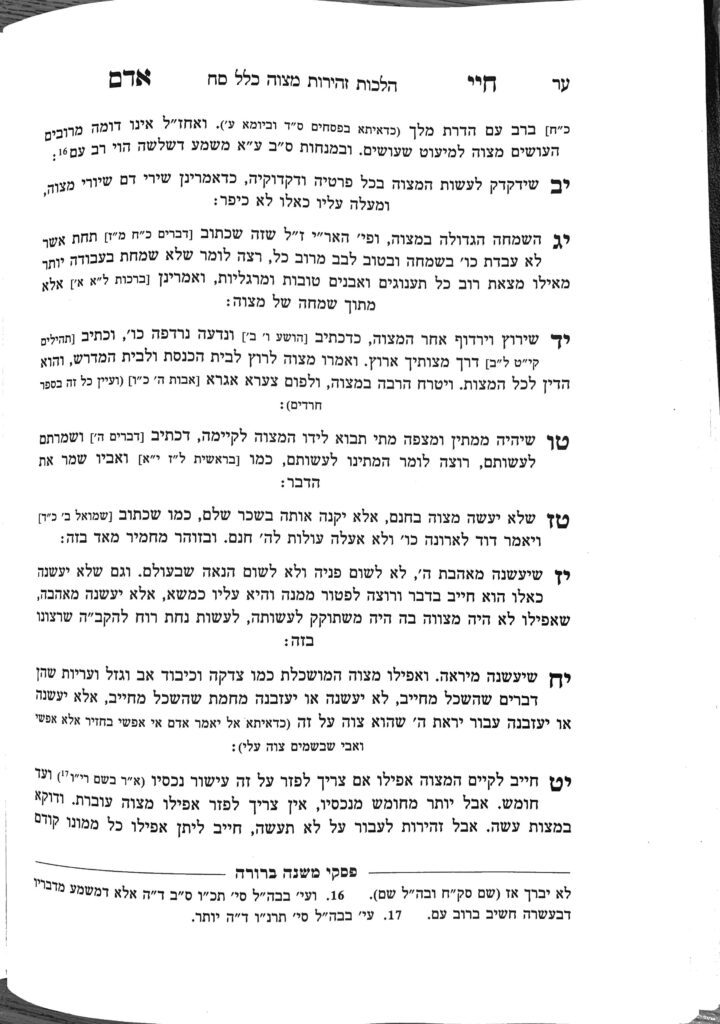We are continuing in siman 18, where the Chayei Adam discusses performing mitzvos out of yirah. We will clarify a few points.
The concept of yirah is the idea of holding back. When one is in awe, they recognize their limitations, so they pull back. The Maharal points out that we use the phrases ahavas Hashem, yiras Hashem and yiras shamayim, but we do not use the phrase ahavas shamayim. He explains that the idea of yiras shamayim is that Hashem is above and we are below; that there is a gap between us, and that one should respect that gap. The concept of ahavah is to reach out over the gap to connect to Hashem, so if we were to employ the concept of ahavas shamayim, it would be contradictory in terms. We use the term yiras shamayim to stress how small and puny we are vis a vis Hashem.
Hashem does not need our agreement for His mitzvos. It would be inappropriate to go to Rav Moshe ztl and affirm that one agrees to one of his teshuvos or psakim, even if the teshuva made sense logically, because Rav Moshe’s teshuvos are not based purely on the whims of his “opinion”, but on his broad and deep understanding of the world and of Hashem’s Torah, which is incomparable to our understanding. Similarly, even if a mitzvah “makes sense”, it is inappropriate to perform the mitzvah simply because our sechel “agrees” to it. Recognizing that our sechel is limited is a fulfillment of yiras Hashem, because it is an expression of a person’s awareness of the gap between him and Hashem.
On the other hand, there is a concept of mishpatim, mitzvos which can be understood using sechel. The Brisker Rov brings from Rav Chaim Brisker that included in the concept of histakel b’oraysa u’vara alma, the idea that the Torah was the blueprint through which Hashem created the world (Zohar) , is the idea that our minds can understand certain concepts around the Torah. If the world was created around the Torah, it is logical that Hashem made the world in a way in which the Torah makes sense to our sechel.
Taking this concept a step further, the Ramchal, in Derech Eitz Chaim, writes that if Hashem made a world in which there is a mitzvah to learn Torah, it is obvious that He made our minds in a way which understands Torah. Since Torah is so integral to the world, it would be illogical for Hashem to make a mind which cannot understand Torah, much in the same way that one does not use a fork to remove liquid from a pot. If one is not able to understand Torah, there must be some kabbalistic block which is preventing the Torah from being absorbed, but the true state of being should be that the mind connects to Torah.
There are certain parts to Torah which are beyond the mind, but there are many parts which are within the realms of the mind. For example, there are many halachos in nezikin which Chazal have figured out through sevara. The Gemara says in places that it could have derived something from sevara in the same way it was derived from a pasuk, and in some places the Gemara even says lama li kra sevara hu, the pasuk is superfluous because the halacha could have been learned from sevara.
In this siman, the Chayei Adam is teaching us that nonetheless, when a person does a mitzvah, they should do the mitzvah because it is the command of Hashem, and not because they could have used their own mind to conclude it. When they do so, the Chayei Adam understands that it is a true expression of yiras shamayim, because a person recognizes that it is not their own sechel that brought them to follow a mitzvah, but Hashem’s command.
Summary
A person should perform all mitzvos, even mitzvos which can be understood with one’s sechel, out of yirah; that is, an understanding that they are performing this mitzvah because it is ratzon Hashem.



